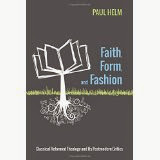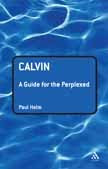We are in the middle of a short series of Analyses on Tom Wright's book Justification: God’s Plan and Paul’s Vision. (The trajectory of the series is not quite turning out as originally planned, but never mind.)
This month we continue our examination of the Bishop's argument first by underscoring the point made by John Piper in The Future of Justification that God's righteousness is wider than covenant faithfulness. This is not only a point of sound theology, but also a point of logic.
We then see that most of the elements of the Reformed account of the atonement and its place in justification are in fact endorsed by Wright - Christ's death is the 'basis' of justification, he acts as a substitute, as a result of which God 'reckons' us to be 'in the right'.
In the next post, in September, I do not pursue the obvious next question, which is: What then is so new about the new perspective if so much of the old perspective is still in place? Rather, I shall ask- what is it that Wright objects to about the place that the Reformed account of justification finds for the imputation of Christ's righteousness? And is he consistent to object to it as he does?
The second post is a further draft extract from the forthcoming Calvin at the Centre (OUP), this time on Calvin and Stoicism.
skip to main |
skip to sidebar

Philosophical Theology
About Me

- Paul Helm
- Prof. History & Philosophy of Religion, King's College, London, 1993-2000
Each Month
In general, early each month the draft of a paper on a topic in philosophical theology is posted, and often a shorter more occasional piece in mid-month.
Augustine
'It is a matter of no moment in the city of God whether he who adopts the faith that brings omen to God adopts it in one dress and manner of life or another, so long as he lives in conformity with the commandments of God. And hence, when philosophers themselves become Christians, they are compelled, indeed, to abandon their erroneous doctrines, but not their dress and mode of living, which are no obstacle to religion.'
Translate
Blog Archive
- January 2023 (1)
- December 2022 (1)
- October 2022 (2)
- September 2022 (1)
- July 2022 (1)
- June 2022 (2)
- May 2022 (1)
- April 2022 (1)
- February 2022 (2)
- December 2021 (1)
- November 2021 (2)
- October 2021 (1)
- September 2021 (1)
- August 2021 (1)
- July 2021 (1)
- June 2021 (1)
- April 2021 (1)
- March 2021 (1)
- February 2021 (1)
- January 2021 (1)
- December 2020 (1)
- September 2020 (1)
- July 2020 (2)
- June 2020 (1)
- May 2020 (1)
- April 2020 (1)
- March 2020 (1)
- February 2020 (1)
- January 2020 (1)
- December 2019 (1)
- November 2019 (1)
- October 2019 (1)
- August 2019 (1)
- July 2019 (1)
- June 2019 (1)
- April 2019 (2)
- March 2019 (1)
- February 2019 (1)
- December 2018 (2)
- October 2018 (2)
- September 2018 (1)
- June 2018 (1)
- April 2018 (1)
- March 2018 (1)
- February 2018 (1)
- January 2018 (1)
- December 2017 (1)
- November 2017 (1)
- September 2017 (1)
- June 2017 (1)
- May 2017 (1)
- April 2017 (1)
- March 2017 (1)
- February 2017 (1)
- January 2017 (1)
- December 2016 (1)
- November 2016 (1)
- October 2016 (1)
- September 2016 (2)
- August 2016 (1)
- July 2016 (1)
- June 2016 (2)
- May 2016 (2)
- April 2016 (1)
- March 2016 (2)
- February 2016 (2)
- January 2016 (2)
- December 2015 (2)
- November 2015 (2)
- October 2015 (2)
- September 2015 (2)
- August 2015 (1)
- July 2015 (1)
- June 2015 (2)
- May 2015 (3)
- April 2015 (2)
- March 2015 (2)
- February 2015 (2)
- January 2015 (2)
- December 2014 (2)
- November 2014 (3)
- October 2014 (2)
- September 2014 (2)
- August 2014 (2)
- July 2014 (2)
- June 2014 (2)
- May 2014 (2)
- April 2014 (2)
- March 2014 (2)
- February 2014 (2)
- January 2014 (1)
- December 2013 (2)
- November 2013 (2)
- October 2013 (1)
- September 2013 (1)
- August 2013 (2)
- July 2013 (2)
- June 2013 (2)
- May 2013 (2)
- April 2013 (2)
- March 2013 (2)
- February 2013 (2)
- January 2013 (2)
- December 2012 (3)
- November 2012 (2)
- October 2012 (2)
- September 2012 (3)
- August 2012 (3)
- July 2012 (1)
- June 2012 (3)
- May 2012 (1)
- April 2012 (1)
- March 2012 (1)
- February 2012 (1)
- January 2012 (1)
- December 2011 (2)
- November 2011 (2)
- October 2011 (2)
- September 2011 (2)
- August 2011 (2)
- July 2011 (3)
- June 2011 (3)
- May 2011 (4)
- April 2011 (3)
- March 2011 (3)
- February 2011 (3)
- January 2011 (1)
- December 2010 (3)
- November 2010 (3)
- October 2010 (5)
- September 2010 (1)
- August 2010 (5)
- July 2010 (3)
- June 2010 (3)
- May 2010 (3)
- April 2010 (1)
- March 2010 (5)
- February 2010 (2)
- January 2010 (2)
- December 2009 (5)
- November 2009 (1)
- October 2009 (6)
- September 2009 (1)
- August 2009 (4)
- July 2009 (7)
- June 2009 (3)
- May 2009 (3)
- April 2009 (1)
- March 2009 (3)
- February 2009 (3)
- January 2009 (3)
- December 2008 (5)
- November 2008 (3)
- October 2008 (3)
- September 2008 (3)
- August 2008 (2)
- July 2008 (2)
- May 2008 (2)
- April 2008 (2)
- March 2008 (2)
- February 2008 (3)
- January 2008 (3)
- December 2007 (2)
- November 2007 (2)
- October 2007 (2)
- September 2007 (2)
- August 2007 (1)
- July 2007 (1)
- June 2007 (1)
- May 2007 (1)
- April 2007 (2)
Analysis
- Ecclesiastes and the new Testament
- The Message of Ecclesiastes - Living present-ly
- Calvin's Two Liberties
- 'Calvinism' Latte, Cappucino, Americano?
- Experimental of 'experiential'
- Calvin on Rebellion
- Issues in Theology - Series Outline
- Definitions
- Propositions & Speech Acts
- Bishop N.T. Wright's ordo salutis
- Systematic and Biblical Theology
- Are revealed truths timeless?
- Losing Sight of the Insight
- John Calvin's Stroke of Genius
- The Gifts of the King
- 'Saving the Planet' - What's the best bet?
- 'Saving the Planet' - What's the stake?
- 'Inspiration and Incarnation' one more time
- The will of Calvin's God - can God be trusted?
- Which Comes First?
- Twisse's Twist
- Owen's Option
- Baxter's Soup and Wright's Soap
- Aspirational Theology
- The Phenomena
- Unexpected Help
- Tell Me The Old, Old Story
- A Bit of Logic
- Causes and Conditions
- History and Dogma
- The Gift of Gill
- Nemo Obligatur ad Impossibile
- The Language and Theology of the 'Free Offer'
- 'What I have written, I have written'.
- Hodge and Hymn Singing
- Shunning Middle Knowledge
- Why Covenant Faithfulness is not Divine Righteousness (and cannot be).
- Wright in General
- Wright and Righteousness
- Nature and Grace
- The Logic of Imputation
- Wright and the Reformation
- Senses, Intellect and Spirit
- Divine Realities
- Three Grades of Propositional Involvement
- Two Lessons from John Owen - I The Trinity
- Two Lessons from John Owen - II Reasons and Reasoning
- Voluntarism and Ignorance
- The Covenant of Redemption and Tritheism
- Perfect Being Theology
- Aquinas on Predestination
- Aquinas on divine impassibility
- Calvin on universal preaching
- John Calvin's Commitments
- Effectual Calling
- God and the Limits of Explanation
- Distinctions and Divisions
- Does Justification Cause Sanctification?
- Romans 2 & 3: One Step at a Time, Dear Jesus
- Augustine at 18: The Love of Wisdom
- Augustine and the Categories
- It ain't necessarily so
- It ain't necessarily so - second half
- The Temporary Christian - Augustine
- The Temporary Christian - Calvin
- Vermigli on Aristotle
- Ridgley on the Trinity
- Ridgley - II
Taking a Line
- Circumstances Change
- Affections and Emotions (again)
- I vow to Thee my country...There is another country
- Pink and Murray and Jonathan Edwards
- Two Kingdoms and 'gay marriage'
- A Small Helping of Negative Theology
- Plantinga's Point
- Pascal and Scepticism
- Turretin on the Senses
- Praying and Groaning
- Warfield's Blind Spot?
- Warfield and the Dutch
- B.B. Warfield
- Asking Jesus into my heart
- Baring Our Soul's: John Piper's Christian Hedonism
- A Twenty Minute Bike Ride Away
- Spit It Out!
- Can This Be True?
- The Many Shades of Calvinism
- Salvation and the Life after Life
- Problems of Evil
- What it means to be Objective
- On Getting Involved in Politics
- Strange Things Happen in a Court of Law
- The MP for Banbury
- Fashion
- Gordon on Calvin
- A Tale of Two Wills
- Crisp Christology
- The Reformed Objection to Natural Theology
- The Living Past
- CRT on JI
- 'JI' - 2
- 'JI'
- Dynamic Equivalence: Another penn'orth
- Dynamic Equivalence - Is there such a thing?
- Parris at the weekend
- Expressing the Ineffable
- Paradox and Mystery
- 'Hip! Hip! Hooray! Hip! Hip Hooray!' - Two Cheers for Consumer Religion.
- New Books, Fresh Books
- Anyone for Meta-hermeneutics?
- Tough Civility & Civic Religion
- Speaking Up for Heaven
- A Time to Keep Silence
- 'State of Fear'
- Piggy in the Middle
- Some Remarks on 'Creationism'
Blasts from the Past
- God, Both Impassible & Impassioned
- Impassible & Impassioned
- A God Without Parts
- Christian Hedonism: Further Thoughts
- Religious Affection and Enthusaism
- Of Faith and Reason: Locke and Edwards
- Edwards and John Locke on Emotion
- Dr Sean Lucas's Friendly Correction
- Religious Affection: Jonathan Edwards's Strategy
- Jonathan Edwards: Some Circumstantial Evidence
- Natural Law and the Two Kingdoms - Further Remarks
- Music, Senses and Emotion
- From Hippo to Escondido - II
- From Hippo to Escondido - I
- An English Assembly
- Vanhoozer V - Don't Forget the Oneliners
- Vanhoozer IV - The Personal and the Mechanical
- Vanhoozer III - KJV and Lydia of Thyatira
- Vanhoozer II? Anything of Substance?
- Vanhoozer I - Remythologizing Theology
- Two Approaches to the Incarnation
- Charles Hodge, The Enlightenment and Natural Theology
- Warfield's Path
- Theistic Compatibilism
- Calvin and the Stoics
- Augustine and Calvin on the Knowledge of God
- Theological Compatibilism - Two Counter-arguments
- Theological Compatibilism: A Case of Faith Seeking Understanding
- Two Concepts of God
- Lapsing into Nothingness
- Cross, Calvin and Causal Presence
- 'Incomprehensibly Made Man'
- Natural Law and Common Grace
- Natural Law and Biblical Law
- Edwards on the Trinity
- Design Arguments and Apologetics
- John Calvin - What's the Big Idea?
- 'Fundamentalism' and the Word of God - Fifty Years Old!
- Eternalism contra Craig
- And then.....
- Charles Hodge and the Method of Systematic Theology
- Calvin's Definitions
- Justification
- Imputation and the Grammar of Justification







